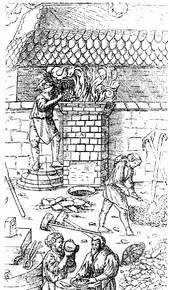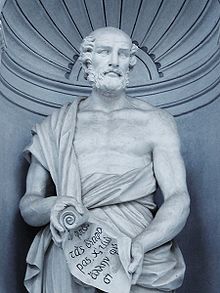Portal:History of science
The History of Science Portal
The history of science covers the development of science from ancient times to the present. It encompasses all three major branches of science: natural, social, and formal. Protoscience, early sciences, and natural philosophies such as alchemy and astrology during the Bronze Age, Iron Age, classical antiquity, and the Middle Ages declined during the early modern period after the establishment of formal disciplines of science in the Age of Enlightenment.
Science's earliest roots can be traced to Ancient Egypt and Mesopotamia around 3000 to 1200 BCE. These civilizations' contributions to mathematics, astronomy, and medicine influenced later Greek natural philosophy of classical antiquity, wherein formal attempts were made to provide explanations of events in the physical world based on natural causes. After the fall of the Western Roman Empire, knowledge of Greek conceptions of the world deteriorated in Latin-speaking Western Europe during the early centuries (400 to 1000 CE) of the Middle Ages, but continued to thrive in the Greek-speaking Byzantine Empire. Aided by translations of Greek texts, the Hellenistic worldview was preserved and absorbed into the Arabic-speaking Muslim world during the Islamic Golden Age. The recovery and assimilation of Greek works and Islamic inquiries into Western Europe from the 10th to 13th century revived the learning of natural philosophy in the West. Traditions of early science were also developed in ancient India and separately in ancient China, the Chinese model having influenced Vietnam, Korea and Japan before Western exploration. Among the Pre-Columbian peoples of Mesoamerica, the Zapotec civilization established their first known traditions of astronomy and mathematics for producing calendars, followed by other civilizations such as the Maya.
Natural philosophy was transformed during the Scientific Revolution in 16th- to 17th-century Europe, as new ideas and discoveries departed from previous Greek conceptions and traditions. The New Science that emerged was more mechanistic in its worldview, more integrated with mathematics, and more reliable and open as its knowledge was based on a newly defined scientific method. More "revolutions" in subsequent centuries soon followed. The chemical revolution of the 18th century, for instance, introduced new quantitative methods and measurements for chemistry. In the 19th century, new perspectives regarding the conservation of energy, age of Earth, and evolution came into focus. And in the 20th century, new discoveries in genetics and physics laid the foundations for new sub disciplines such as molecular biology and particle physics. Moreover, industrial and military concerns as well as the increasing complexity of new research endeavors ushered in the era of "big science," particularly after World War II. (Full article...)
Selected article -

Ferrous metallurgy is the metallurgy of iron and its alloys. The earliest surviving prehistoric iron artifacts, from the 4th millennium BC in Egypt, were made from meteoritic iron-nickel. It is not known when or where the smelting of iron from ores began, but by the end of the 2nd millennium BC iron was being produced from iron ores in the region from Greece to India,[page needed] The use of wrought iron (worked iron) was known by the 1st millennium BC, and its spread defined the Iron Age. During the medieval period, smiths in Europe found a way of producing wrought iron from cast iron, in this context known as pig iron, using finery forges. All these processes required charcoal as fuel.
By the 4th century BC southern India had started exporting wootz steel, with a carbon content between pig iron and wrought iron, to ancient China, Africa, the Middle East, and Europe. Archaeological evidence of cast iron appears in 5th-century BC China. New methods of producing it by carburizing bars of iron in the cementation process were devised in the 17th century. During the Industrial Revolution, new methods of producing bar iron by substituting coke for charcoal emerged, and these were later applied to produce steel, ushering in a new era of greatly increased use of iron and steel that some contemporaries described as a new "Iron Age". (Full article...)
Selected image

The iconic frontispiece to Johannes Kepler's 1627 Rudolphine Tables pays tribute to earlier great astronomers, including Copernicus, Ptolemy and most prominently Tycho Brahe. It was used in 2005 as the emblem for the joint meeting of the History of Science Society and the Society for the History of Technology.
Did you know
...that the word scientist was coined in 1833 by philosopher and historian of science William Whewell?
...that biogeography has its roots in investigations of the story of Noah's Ark?
...that the idea of the "Scientific Revolution" dates only to 1939, with the work of Alexandre Koyré?
Selected Biography -
Theophrastus (/ˌθiː.əˈfræstəs/; Ancient Greek: Θεόφραστος, romanized: Theophrastos, lit. 'godly phrased'; c. 371 – c. 287 BC) was an ancient Greek philosopher and naturalist. A native of Eresos in Lesbos, he was Aristotle's close colleague and successor as head of the Lyceum, the Peripatetic school of philosophy in Athens. Theophrastus wrote numerous treatises across all areas of philosophy, working to support, improve, expand, and develop the Aristotelian system. He made significant contributions to various fields, including ethics, metaphysics, botany, and natural history. Often considered the "father of botany" for his groundbreaking works "Enquiry into Plants" (Ancient Greek: Περὶ φυτῶν ἱστορία, romanized: Peri phytōn historia) and "On the Causes of Plants," (Ancient Greek: Περὶ αἰτιῶν φυτικῶν, romanized: Peri aitiōn phytikōn) Theophrastus established the foundations of botanical science. His given name was Tyrtamos (Ancient Greek: Τύρταμος); the nickname Theophrastus ("divine speaker") was reputedly given to him by Aristotle in recognition of his eloquent style.
He came to Athens at a young age and initially studied in Plato's school. After Plato's death, he attached himself to Aristotle who took to Theophrastus in his writings. When Aristotle fled Athens, Theophrastus took over as head of the Lyceum. Theophrastus presided over the Peripatetic school for thirty-six years, during which time the school flourished greatly. He is often considered the father of botany for his works on plants. After his death, the Athenians honoured him with a public funeral. His successor as head of the school was Strato of Lampsacus. (Full article...)
Selected anniversaries
- 1677 - Birth of Jacques Cassini, French astronomer (d. 1756)
- 1700 - Birth of Daniel Bernoulli, Dutch-born mathematician (d. 1782)
- 1807 - Birth of Benjamin Waterhouse Hawkins, English sculptor and naturalist (d. 1889)
- 1834 - Birth of Dmitri Mendeleev, Russian chemist (d. 1907)
- 1856 - Death of Agostino Bassi, Italian entomologist (b. 1773)
- 1906 - Birth of Chester Carlson, American physicist and inventor (d. 1968)
- 1907 - Death of Hendrik Willem Bakhuis Roozeboom, Dutch chemist (b. 1854)
- 1957 - Death of Walther Bothe, German physicist and inventor, Nobel laureate (b. 1891)
- 1957 - Death of John von Neumann, Hungarian-born mathematician and physicist (b. 1903)
- 1969 - Allende meteorite falls near Pueblito de Allende, Chihuahua, Mexico
- 1975 - Death of Robert Robinson, British chemist, Nobel laureate (b. 1886)
Related portals
Topics
General images
Subcategories
Things you can do
Help out by participating in the History of Science Wikiproject (which also coordinates the histories of medicine, technology and philosophy of science) or join the discussion.
Associated Wikimedia
The following Wikimedia Foundation sister projects provide more on this subject:
-
Commons
Free media repository -
Wikibooks
Free textbooks and manuals -
Wikidata
Free knowledge base -
Wikinews
Free-content news -
Wikiquote
Collection of quotations -
Wikisource
Free-content library -
Wikiversity
Free learning tools -
Wiktionary
Dictionary and thesaurus









































































